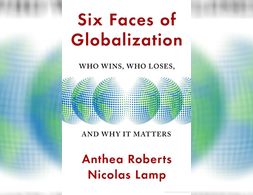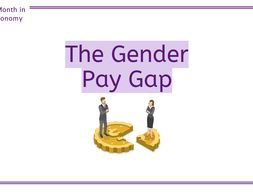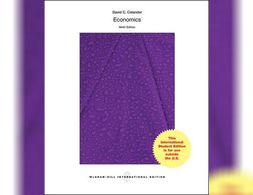✕
166 results
In this ambitious and impressive new book, journalist Howard French seeks to excavate the long elided central importance of the African continent as the “linchpin of the machine of modernity.” In the story of modernity, he writes, the role of Africa is diminished, trivialized, and erased, and by filling in some gaps in this story, he retells the story of modernity.
An ideal type of a pluralistic book. Instead of arguing for one specific interpretation of a complex phenomenon, the authors present six different views on globalisation. Roberts and Lamp carefully balance the different perspectives, presenting the merits of each.
"Stabilise, liberalise and privatise" has, since the debt crisis of the early 1980s, been the mantra chanted at developing countries by international financial institutions, donor countries and newspaper columnists with quasi-religious conviction.
In analyzing the global competition between Chinese and Indian tea, Andrew B. Liu challenges past economic histories premised on the technical “divergence” between the West and the Rest, arguing instead that seemingly traditional technologies and practices were central to modern capital accumulation across Asia.
From the mercantile monopolies of seventeenth-century empires to the modern-day authority of the WTO, IMF, and World Bank, the nations of the world have struggled to effectively harness globalization's promise. The economic narratives that underpinned these eras the gold standard, the Bretton Woods regime, the "Washington Consensus" brought great success and great failure.
This book provides a comprehensive description of this intriguing new area of feminist economics. It includes discussion of what constitutes feminist economics and how feminist economics is different from other approaches
Rethinking Regulation of International Finance encapsulates the most important aspects of the development and operation of the international financial system. This book questions the fundamental basis of the existing international financial architecture (soft law) and explores the need for a compliance-based model based on legitimacy of regulations and accountability of the regulatory bodies in international financial stability.
Dani Rodrik reflects in this book on important questions about how economics works and what might be wrong with it. He points out flaws and weakness of the discipline, but also argues that certain criticisms which have brought forward against are without merit. His central point is that there is not just one economic model, but a variety of them and it is important to apply judgment when selecting the most suitable one for a particular situation.
Behavioural economics deals with observing behaviour and economic decision making behaviour.
Austrian economics focuses on the economic coordination of individuals in a market economy. Austrian economics emphasises individualism, subjectivism, laissez-faire politics, uncertainty and the role of the entrepreneur, amongst others.
Beyond Growth is a collection of educational materials offering a reflection on growth. It was created as a joint project of the associations Fairbindung e. V. and Konzeptwerk Neue Ökonomie, both based in Germany. The page provides learning materials and methods to stimulate thinking about the conditions of our current economy as well as possible alternatives.
Caring activities are one central element of feminist economists' analysis – also since in particular unremunerated work is a blind spot in mainstream economics and most other economic paradigms. Those focus on the market sphere: activities are considered as productive and as real labour if they are remunerated and market-intermediated. Goods and services are considered as labour if they create a value which can be traded on the market. Feminist Economics remarks that this perspective creates certain dichotomies and consequent devaluations: unproductive – productive; private – public; unpaid – remunerated OR paid less – well paid; female – male; soft work – hard work; caring – rationality.
Noneconomists often think that economists' approach to race is almost exclusively one of laissez-faire. Racism, Liberalism, and Economics argues that economists' ideas are more complicated.
This chapter discusses the role of gender in economic relations, processes, and outcomes. Gender differences in economic outcomes such as labor force participation and wages have received growing attention from economists in the last several decades – a positive and much needed development in economic thinking.
Feminist economics is a key component of the movement for pluralism in economics and one that has, to some extent, been acknowledged by the mainstream of the profession. It seeks to highlight issues which affect women because (it claims) they have not traditionally been recognised in a field dominated by men. On top of this, it seeks to carve out a space for women in the discipline, both for intrinsic reasons of fairness and diversity and because it means that women’s issues are more likely to be highlighted going forward.
The rise of capitalism to global dominance is still largely associated – by both laypeople and Marxist historians – with the industrial capitalism that made its decisive breakthrough in 18th century Britain.
The 2022 FIFA World Cup (including the construction work required for it) provides a clear example of economic activity that has taken place despite the financial costs to the Qatari state being an order of magnitude larger than the financial benefits it will receive. Whilst this is a fairly extreme case in terms of how many different costs and benefits are involved and how unequally they have been spread, many economic decisions are more complicated than mere financial calculations and it is therefore vital for students to be able to think about multiple dimensions involved in economic decisions.
Big challenges lie ahead for our society: increased automation of work, and the threat of catastrophic climate change. But so, too, are the huge possibilities presented by new technology and better ways of organising our economy in the wake of neoliberalism's failure.
The gender pay gap is a pressing issue that affects individuals and society as a whole, so it is important for economics students to understand it. Despite recent progress, women still earn less than men for the same jobs, leading to economic inequalities and reduced efficiency (see, for example, the recent report released by Moody’s). Understanding the causes and consequences of the gender pay gap is critical in developing policies that promote fairness and equality.
Aim of this intensive workshop is 1.) to introduce the participants to the macroeconomic workings of the climate crisis as the background of sustainable finance; 2.) to introduce financial assets with ESG (Environmental, Social and Governance) criteria attached to them and their markets and important institutional players; 3.) to provide a critical perspective on the current setup of sustainable finance; 4.) and to work on in-depth case studies illustrating the workings on ESG-finance markets, its emitters and traders as well as their macroeconomic implications.
The notion that the demand and supply side are independent is a key feature of textbook undergraduate economics and of modern macroeconomic models. Economic output is thought to be constrained by the productive capabilities of the economy - the ‘supply-side' - through technology, demographics and capital investment. In the short run a boost in demand may increase GDP and employment due to frictions such as sticky wages, but over the long-term successive rises in demand without corresponding improvements on the supply side can only create inflation as the economy reaches capacity. In this post I will explore the alternative idea of demand-led growth, where an increase in demand can translate into long-run supply side gains. This theory is most commonly associated with post-Keynesian economics, though it has been increasingly recognised in the mainstream literature.
Helps students succeed in the principles of economics course. This title offers trademark colloquial approach that focuses on modern economics, institutions, history, and modeling, and is organized around learning objectives to make it easier for students to understand the material and for instructors to build assignments within Connect Plus.
Michael Kalecki famously remarked “I have found out what economics is; it is the science of confusing stocks with flows”. Stock-Flow Consistent (SFC) models were developed precisely to address this kind of confusion. The basic intuition of SFC models is that the economy is built up as a set of intersecting balance sheets, where transactions between entities are called flows and the value of the assets/liabilities they hold are called stocks. Wages are a flow; bank deposits are a stock, and confusing the two directly is a category error. In this edition of the pluralist showcase I will first describe the logic of SFC models – which is worth exploring in depth – before discussing empirical calibration and applications of the models. Warning that there is a little more maths in this post than usual (i.e. some), but you should be able to skip those parts and still easily get the picture.
Economic sociology is an entire subfield and one could write an series on it, so I’m going to stick to probably the most prominent economic sociologist and the founder of ‘new economic sociology’, Mark Granovetter.
A historical glimpse of how economists of the 19th century debated the usefulness of mathematics to economics
On July 2020 ZOE-Institute published a unique platform for transformative policymaking: Sustainable Prosperity. Building on insights from new economic thinking the platform provides knowledge about ideas, arguments and procedures that support effective promotion of political change. It aims to strengthen change makers in public policy institutions, who are working on an ambitious green and just transition. As such, it provides convincing arguments and policy ideas to overcome the reliance of economic policy on GDP growth
This course is designed to provide students with an understanding of work-related gender issues and to enable students to analyze the issues using the tools of economics.
This film looks at the role economic growth has had in bringing about this crisis, and explores alternatives to it, offering a vision of hope for the future and a better life for all within planetary boundaries.
What possibilities exist for a fairer world Can one person truly make a difference In this social sciences course we sample the possibilities and limits of social change in an interconnected inequitable global landscape This course features in depth examinations of the rise of garment work for Bangladeshi women a …
Economic theory is currently at a crossroads, where many leading mainstream economists are calling for a more realistic and practical orientation for economic science. Indeed, many are suggesting that economics should be reconstructed on evolutionary lines.
This book is about the application to economics of evolutionary ideas from biology.
This book is about the application to economics of evolutionary ideas from biology.
This essay suggests to bring together two aspects of economic thought which so far have developed largely separately: degrowth and feminist economics. In this strive, the concept of care work and its role in feminist economics will be introduced and the downsides of the commodification of care work will be discussed. Subsequently, contributions to the discussion on the (re)valuation of care work will be taken into account.
Whether a black swan or a scapegoat, Covid-19 is an extraordinary event. Declared by the WHO as a pandemic, Covid-19 has given birth to the concept of the economic “sudden stop.” We need extraordinary measures to contain it.
We use cookies on our website. Click on Accept to help us to make Exploring Economics constantly better!































